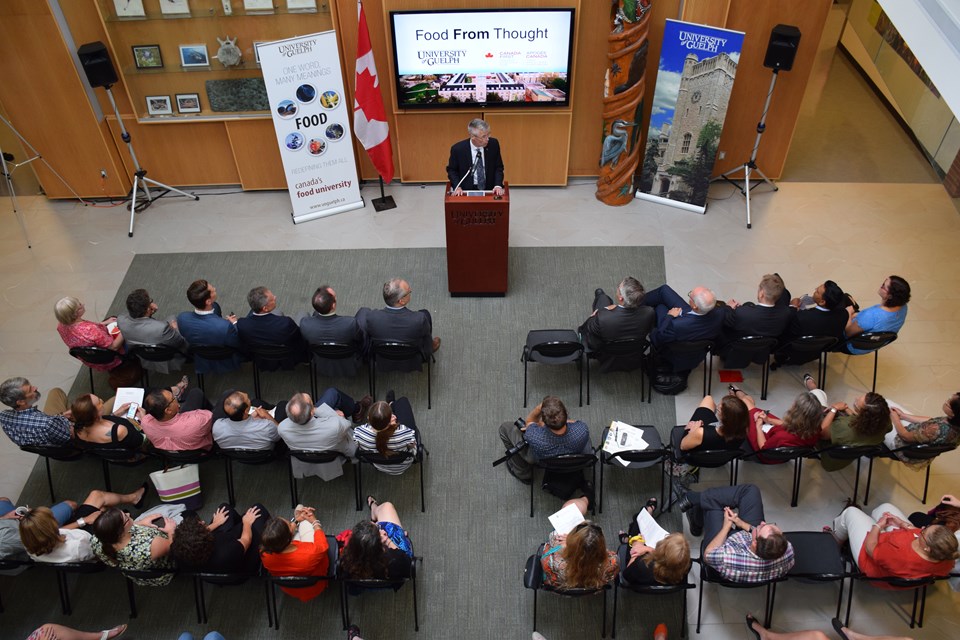|
GUELPH, ON - The University of Guelph has been handed the largest single envelope of research funding it has ever received.
Also read, Saskatchewan scientists develop PEDV vaccine. The federal government has staked U of G’s intricate, internationally renowned food research network with a staggering $76.6 million, money to fund the institution’s Food From Thought research project over the next seven years. The project will use advanced information systems to enhance food production while sustaining the planet’s ecosystems. Ten university researchers have been named to a leadership team on the project. They include those with expertise in plant genome biology, soil and weed ecology, food-borne pathogens, DNA-based identification systems, livestock diseases, and animal care. Evan Fraser, director of U of G’s Food Institute, will serve as scientific director of Food From Thought. During a funding announcement at the Biodiversity Institute of Ontario on campus Thursday morning, university officials said the food security challenges of an ever-expanding global population will be solved scientifically, through data collection and research that both protects and enhances food production. The university’s research is deeply rooted in agriculture, extends across all colleges, and has the capacity to make a massive difference in the world, they said. The funding is part of a $900 million package from the federal Canada First Research Excellence Fund, that is being spread around like research fertilizer this week to 13 post-secondary institutions across the country. The funding targets the areas of research strength of each university. Guelph MP Lloyd Longfield delivered the funding on behalf of Kirsty Duncan, Canada’s Minister of Science. He said U of G is a world class contributor to agricultural research, with expertise in the area dating back over 130 years. “Guelph has lead Canada’s research in plant and animal science,” he said. “The Canada First Research Excellence Fund supports the efforts of select Canadian post-secondary institutions to turn their key research strengths into world leading capabilities.” The research areas the university is expert in have long-term economic benefits for Canada, he said. The funding will help Canadian universities better compete for talent and partnership opportunities globally, and lead to breakthrough discoveries. “This funding announcement will give Canada a huge step forward to become the global leader in food,” Longfield said. “And as always, the University of Guelph will be there.” U of G president Franco Vaccarino said the news is important for the university, the country and the world. “With food related research and teaching strengths across all seven colleges, we are already known as Canada’s food university,” he said. “This announcement really consolidates that identity, and strengthens that identity as a leader in agriculture.” He said if U of G can bring together its diverse strengths in agriculture and “bring it to bear on issues of the day, I think there is no stopping us.” The overall $900 million research funding, he added, will position Canada as an international leader in sustainable food production. “It will generate, mobilize and commercialize knowledge, while training the next generation of agri-food thought leaders, turning knowledge into action,” he added. The university has ambitious plans to develop the knowledge and tools needed to feed the world’s population, he said. Those plans include formulae for producing that food in a way that sustains the planet’s ecosystems. Evan Fraser said the funding places U of G at the forefront of an “upcoming digital agriculture revolution” that involves a new, predictive environmental science. It’s a “huge and lofty” agenda. The initiative, he added, has private sector partners such as IBM, Maple Leaf, and Loblaws. Integrating all of the university’s agricultural assets, Fraser said, “is a game-changing opportunity for us.” “To gather data on an unprecedented scale about agri-food systems, and from this drive a paradigm shift in our understanding of food systems,” he said. The future of food must enhance biodiversity, produce safe, nutritious food, while improving animal welfare and human health, Malcolm Campbell, vice-president (research) said. Food From Thought will offer new teaching and research opportunities, and help expand the use of DNA barcoding technology, and the use of so-called “big data” on farms to reduce pesticide use, monitor the health of watersheds, and allow better crop selection given climate change impacts. Among the 12 other initiatives funded across Canada are one aimed at the sustainable development of oceans, another dedicated to next-generation medical technologies, and one related to improving human brain health. Source Rob O'Flanagan, Guelph Today
0 Comments
Leave a Reply. |
Advertisement
News & Updates
Stay informed with the latest news around foodservice, agriculture and other related food news. Advertisement Opportunities
|


 RSS Feed
RSS Feed


